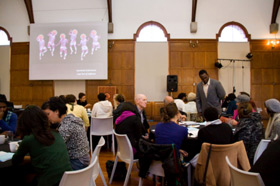Interrogating the power of naming and framing

The event was dreamed into life by 2011 Donald Gordon Creative Arts Award Winner RaélJero Salley, a lecturer in painting and discourse at the Michaelis School of Fine Art whose work is focused on contemporary visual practices and the production of the Black and African Diaspora. According to Salley, everyday life happens through primary activities like social life, politics and history, but basic to each is the giving (and taking) of names. "This fact presents a need to address past legacies and present questions at once for the sake of new futures," he said. The weekend was envisaged as 'a large, malleable space for creative conversations about these "names we give" in an interactive, informal, social environment'.
Archive and Public Culture's NRF Chair Professor Carolyn Hamilton and doctoral research scholar Alexandra Dodd both gave presentations as part of a 'groupthink' called 'Delicious Sensations'. Hamilton presented alongside Ntone Edjabe, Zayd Minty, Leora Farber and Gabi Ncobo on a panel grappling with the idea of 'Collaborative Action' - partnerships and community research. In her presentation, Worthy Ancestors, Archive and the Arts, she explored the crucial role that'individuals can play in the making of the archive', never forgetting that 'people live in the context of relationships with others who collectively shape their identities, with the state, educational institutions, and the media playing a crucial role in the making of identity'.
'We bear enormous responsibility in how we use the past to shape the future, or as Benedict Anderson (following Weber) puts it in order to become worthy ancestors to the as yet unborn collective children,' she argued. 'The stakes are high: archive at once produces and destabilises nation, and the challenge to the worthy ancestor is to proceed in knowledge of the power of archive. The worthy ancestor also bears a responsibility to ensure that the archives, which are the storehouses of materials from and about the past, are cared for and enhanced. But, as we know, all is not well in the institutions charges with this responsibility.'
'The production of the past, and the very archives out of which that past is produced, is always a matter of present-day decisions and choices, of exercises of power and acts of resistance,' said Hamilton.
Dodd appeared alongside co-presenters Crain Soudien, Kathryn Smith and Natalie Pollard as part of a panel tracking the theme of 'Planned Obsolecence' - creative research and development. A magazine story of how 5FM's DJ Fresh turned childhood jeers to his advantage led Dodd to a line by the 13th century mystic Persian poet, Jalaladin Muhammed Rumi: 'The wound is the place where the light enters you.'
From this starting point, she explored 'the generative potential we might find in tags or associations that trouble us, or that in some way bring to light unresolved aspects of ourselves - elements of our identities with which we are ill at ease'.
'I am interested in using research and writing (or creative production in general) to find a productive capacity in things that are disturbing, upsetting or wounding to us,' said Dodd, who went on to apply this conceptual mode to 'the unsettling doubleness' that catalysed her interest in the 19th century and her fascination with 'the postcolonial implications of various manifestations of Victorian figures and tropes in contemporary South African culture'.
Discussions took a non-traditional format, unfolding in a round-table format with an emphasis on sparking group dialogue and possibly starting up thoughtful new collaborations.
The weekend's events opened with a performance of From New Orleans to Cape Town and Places (in) Between by the Mike Rossi Quartet, and the UCT Choir's moving a capella rendition of Weeping, followed by Phillip Miller's REwind: A Cantata for Voice, Tape and Testimony, directed by Gerhard Marx.
Other performances over the weekend included readings of evocative texts such as Paper Flowers, Dutchman and Coloured Son X, under the direction of Sara Machett, Amy Jephta and Fleur du Cap Award Winners, Mwenya Kabwe and Lara Bye. On Saturday evening an Art Attack party featured the music of Ntone Edjabe, Sannie Fox and Machineri, as well as performance installations by Liza Grobler, Sanjin Muftic, Chas Unwin and iKapa Dance Theatre's Theo Ndindwa. Donald Gordon Creative Arts Award winners, Jamila Rodrigues, Steven van Wyk and Kristina Johnstone premiered their work, Fractography.
Film screenings curated by Lesedi Mogoatlhe, included Djibril Diop Mambety's Hyenas and Khalo Matabane's My Beautiful Country.Sunday evening closed with Mingus Ah Um!, a musical tribute to legendary jazz composer, bassist, bandleader and civil rights activist Charles Mingus, directed by Mike Rossi.